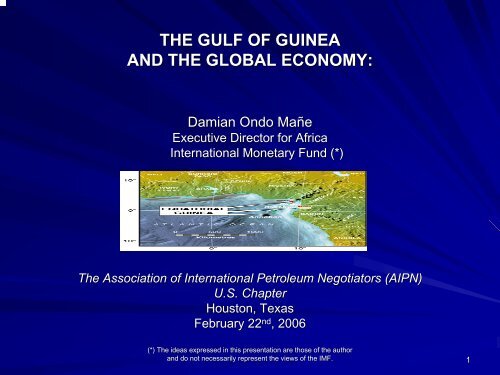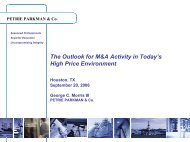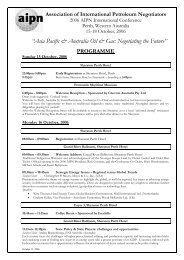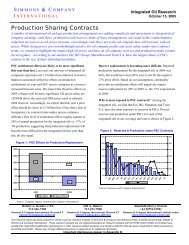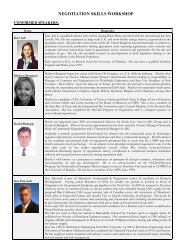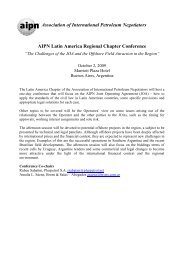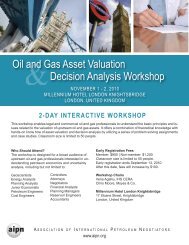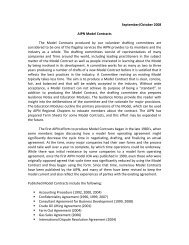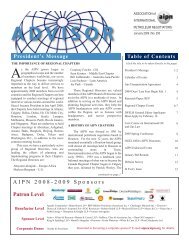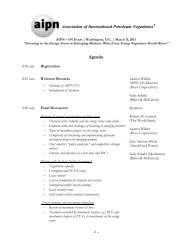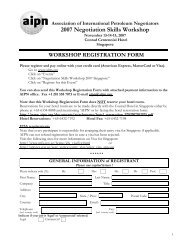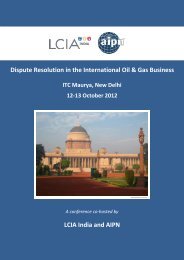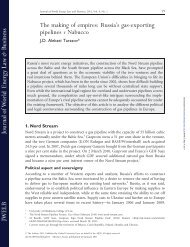the gulf of guinea and the global economy - AIPN
the gulf of guinea and the global economy - AIPN
the gulf of guinea and the global economy - AIPN
- No tags were found...
You also want an ePaper? Increase the reach of your titles
YUMPU automatically turns print PDFs into web optimized ePapers that Google loves.
THE GULF OF GUINEAAND THE GLOBAL ECONOMYOUTLINE:The Potential <strong>of</strong> <strong>the</strong> Gulf <strong>of</strong> GuineaChallenges to Sustainable DevelopmentCoping with <strong>the</strong> Obstacles to Development: A Role for <strong>the</strong>International Business <strong>and</strong> Financial CommunitiesNeed for Urgent ActionsRole for Oil CompaniesConclusion2
I. The Potential <strong>of</strong> <strong>the</strong> Gulf <strong>of</strong> Guinea(1)The region enjoys a comparative advantage for <strong>the</strong>supply <strong>of</strong> oil <strong>and</strong> o<strong>the</strong>r raw materials:‣ Endowment with abundant natural resources, notably oil, naturalgas, forestry <strong>and</strong> fishery;‣ Transportation cost advantage stemming from <strong>the</strong> geographicalposition <strong>of</strong> <strong>the</strong> region: openness to <strong>the</strong> sea <strong>and</strong> relativecloseness to consuming markets;‣ Absence <strong>of</strong> maritime chokepoints;‣ Tremendous potential <strong>of</strong> natural gas.3
I. The Potential <strong>of</strong> <strong>the</strong> Gulf <strong>of</strong> Guinea(2)‣ Tremendous potential <strong>of</strong> natural gas:• In <strong>the</strong> Gulf <strong>of</strong> Guinea, natural gas resources are underexploited <strong>and</strong> <strong>the</strong>levels <strong>of</strong> gas flared or vented are among <strong>the</strong> highest in <strong>the</strong> world d (48%in 2002), which represent an invaluable opportunity cost to <strong>the</strong> region.Estimated Share <strong>of</strong> Flaring <strong>and</strong> O<strong>the</strong>r GasProduction (2002)Flaring48%Senegal0.003%Nigeria33%Angola7%Gabon1%Cameroon0%Republic <strong>of</strong>Congo4%Cote d'Ivoire2%EquatorialGuinea5%4
I. The Potential <strong>of</strong> <strong>the</strong> Gulf <strong>of</strong> Guinea(3)To estimate <strong>the</strong> amount <strong>of</strong> revenues that could be derived from <strong>the</strong>reduction <strong>of</strong> gas flaring in <strong>the</strong> region, we have built three scenarios(we assume that <strong>the</strong> required investments had been made):- <strong>the</strong> current 48% ratio <strong>of</strong> gas flaring;- hypo<strong>the</strong>tical 20% <strong>of</strong> gas flaring; <strong>and</strong>- hypo<strong>the</strong>tical 10% <strong>of</strong> gas flaring.We found that <strong>the</strong> gains in gas production would have amounted to$2.2 billion <strong>and</strong> $3 billion for 2002, relative to <strong>the</strong> current 48% % flaringlevel, respectively under <strong>the</strong> scenarios <strong>of</strong> 20% <strong>and</strong> 10% flaring.5
II. Challenges to Sustainable Development(1)Pro cyclical expenditures, overspending <strong>and</strong> inefficienciese.g. Nigeria, Gabon6
- Pro cyclical expenditures in Nigeria, 1970-2001:Strong correlation between public expenditure <strong>and</strong> oil market developmentselopments(Fiscal measures are in percent <strong>of</strong> GDP)7
- Pro cyclical expenditures in Gabon, 1981-2002:Strong correlation between public expenditure <strong>and</strong> oil market developmentselopments(Fiscal measures are in percent <strong>of</strong> GDP)60Chart 6: Gabon: Fiscal Trends, 1981-2002in percent <strong>of</strong> GDP unless specified o<strong>the</strong>rwise5040302010019811983198519871989199119931995199719992001Total revenue Oil revenue Total expenditureCurrent expenditure Wage Bill Oil price (US$/barrel)8
II. Challenges to Sustainable Development(2)Pro cyclical expenditures, overspending <strong>and</strong>inefficienciesWeak institutional qualityaccording to six indicators (World Bank):- Voice <strong>and</strong> accountability- Political stability- Government effectiveness- Regulatory quality- Rule <strong>of</strong> law- Control <strong>of</strong> corruption9
- Six indicators: weak institutional quality2002Voice <strong>and</strong>Acct.PoliticalStabilityGovernment.Effectiv.Regul.Qual.Rule <strong>of</strong>LawControlCorr.Average OilCountries inGulf <strong>of</strong>Guinea -1.01 -0.93 -0.96 -1.02 -1.11 -1.14Average non OilCountries inGulf <strong>of</strong>Guinea -0.66 -0.75 -0.91 -0.67 -0.80 -0.75Average O<strong>the</strong>r Sub-Saharan AfricanCountries -0.39 -0.39 -0.55 -0.50 -0.48 -0.3410
II. Challenges to Sustainable Development(3)Pro cyclical expenditures, overspending <strong>and</strong>inefficienciesWeak institutional qualityInadequate infrastructureLow spending in education <strong>and</strong> health11
III. Coping with <strong>the</strong> Obstacles to Development <strong>of</strong> <strong>the</strong> Region:A Role for <strong>the</strong> International Business <strong>and</strong> Financial Communities(1)Two positive developments in <strong>the</strong> past decade:‣ Wide recognition, including by <strong>the</strong> Gulf <strong>of</strong> Guineacountries, <strong>of</strong> macroeconomic stability as pre-requisite requisite fordevelopment;‣ Recognition <strong>of</strong> <strong>the</strong> critical importance <strong>of</strong> transparency indoing business, particularly in <strong>the</strong> oil sector <strong>and</strong> o<strong>the</strong>rextractive industries (e.g. EITI)12
III. Coping with <strong>the</strong> Obstacles to Development <strong>of</strong> <strong>the</strong> Region:A Role for <strong>the</strong> International Business <strong>and</strong> Financial Communities(2)International Financial Institutions to help <strong>the</strong> countries preventmismanagement <strong>of</strong> natural resources: Appropriate fiscalstabilization instrumentsThree-fold role for <strong>the</strong> IMF:‣ A partner for reforms;‣ A catalytic role for financing: signaling to private investors;‣ A better partner in <strong>the</strong> dialogue with developing countries.International community to help promote good institutionsthrough political encouragement <strong>and</strong> technical assistance,with <strong>the</strong> view to improve accountability, government effectiveness, s, regulatoryframeworks, respect for <strong>the</strong> rule <strong>of</strong> law, <strong>and</strong> fight against corruptionInternational business <strong>and</strong> financial community to helpcountries cushion against oil market shocks:‣ Economic diversification;‣ Greater access <strong>of</strong> developing country products to markets <strong>of</strong> developedcountries;‣ Improving oil market information <strong>and</strong> transparency.13
IV. Need for Urgent ActionsCountries in <strong>the</strong> region expect very large budget resources in<strong>the</strong> years ahead (e.g. over US $ 350 billion from <strong>the</strong> sole oilsector over 2002-2019);2019);Investments in <strong>the</strong> extractive industries would also result ingreater revenues for <strong>the</strong> local governments, but also higheremployment in <strong>the</strong> region <strong>and</strong> elsewhere;Thanks to endowments in natural resources, <strong>the</strong> region has <strong>the</strong>potential to play a greater role in <strong>the</strong> <strong>global</strong> trade <strong>and</strong> <strong>economy</strong>;Oil era has generated important social dem<strong>and</strong>s in countries <strong>of</strong><strong>the</strong> region, especially in this information age (access <strong>of</strong>populations, including in poor countries, to <strong>the</strong> Internet, CNN,BBC, etc.)Need to tackle <strong>the</strong> maritime security <strong>and</strong> safety issue.15
IV.Need for Urgent Actions(2)The Question <strong>of</strong> Maritime Safety <strong>and</strong> Security‣ Need for a focused <strong>and</strong> coordinated approach throughregional cooperation <strong>and</strong> partnerships;‣ Stylized Facts:• Risks <strong>of</strong> accidents: 85% <strong>of</strong> vessels in <strong>the</strong> region are over 20 year- old(international average is 15%);• Maritime pollution: important urban <strong>and</strong> industrial wastes;• Security concerns: piracy <strong>and</strong> unlawful activities;• Illegal trade: weapons, drugs, people?• Estimated costs <strong>of</strong> insecurity: $370 million each year.16
IV.Need for Urgent Actions(3)The Question <strong>of</strong> Maritime Safety <strong>and</strong> Security (2)What is being done at <strong>the</strong> regional <strong>and</strong> <strong>global</strong> level?‣ Little‣ There are many inter-sectoral <strong>and</strong> cross-country country linkages in <strong>the</strong>security issue that can be better addressed through regionalcoordinationHow best to share information?‣ Use <strong>the</strong> existing institutional bodies (WAEMU, ECOWAS,CEMAC, CEEAC, etc.) to put in place a strategy for maritimesafety <strong>and</strong> security‣ The international community to provide necessary support(capacity <strong>and</strong> technical assistance)17
V. Role for Oil CompaniesThe investment opportunities <strong>of</strong>fered by <strong>the</strong> Gulf <strong>of</strong> Guinea shouldattract <strong>the</strong> business community. Their intervention should takemultiple forms, including joint-ventures with <strong>the</strong> countries’national companies.Key issues:Corporate Governance:‣ Compliance with international best practices on accounting, anti-corruption laws, auditing <strong>and</strong> reporting requirements;‣ Transparency in activities (e.g. full participation to EITI):this will help <strong>the</strong>m make reputational <strong>and</strong> credibility gains, <strong>and</strong>facilitate <strong>the</strong>ir establishment in <strong>the</strong> indigenous locations19
Key Issues:V. Role for Oil Companies(2)Relations between governments <strong>and</strong> oil companies:‣ These countries have all reasons to maintain good relations with oil companies, inlight <strong>of</strong> <strong>the</strong> oil sector in <strong>the</strong>ir <strong>economy</strong> (oil sector contributes to more than 80% <strong>of</strong> totalexports <strong>and</strong> more than 50% <strong>of</strong> government budget in most <strong>of</strong> oil-producing countriesin <strong>the</strong> region).Finding <strong>the</strong> right balance between pr<strong>of</strong>it-seeking on <strong>the</strong>one h<strong>and</strong>, <strong>and</strong> redistribution <strong>of</strong> wealth <strong>and</strong> socialdevelopment on <strong>the</strong> o<strong>the</strong>r h<strong>and</strong>:‣ Create conditions for good partnership <strong>and</strong> trust;‣ Put in place a clear <strong>and</strong> effective institutional framework in which <strong>the</strong> role <strong>of</strong> eachparty is clearly defined;‣ Ensure <strong>the</strong> capability <strong>of</strong> each party to check <strong>the</strong> consistency <strong>of</strong> <strong>the</strong> activities <strong>of</strong> o<strong>the</strong>rswith <strong>the</strong> laws <strong>and</strong> commonly-agreed rules. In this regards, ministries concerned mustbuild human capacity (e.g. Trinidad <strong>and</strong> Tobago where <strong>the</strong> ministry y <strong>of</strong> financecomprises a well equipped technical unit for oil sector matters).20
How Can National Oil Companies (NOCs) contribute to afriendly environment for oil <strong>and</strong> gas activities in <strong>the</strong> Gulf <strong>of</strong>Guinea?NOCs should <strong>and</strong> cannot replace <strong>the</strong>ir international counterparts:lack <strong>of</strong> technological capacity <strong>and</strong> know-how; <strong>and</strong> <strong>the</strong>y haveinsufficient financial resources <strong>and</strong> credibility to access financialmarkets;Benefits <strong>of</strong> having NOCs:‣ Technological transfers to countries;‣ Increase <strong>the</strong> producer country’s s share <strong>of</strong> oil rent;‣ Contribute to reducing tensions between multinationals <strong>and</strong>indigenous populations;‣ Direct control over production volumes by producer countryfacilitates <strong>the</strong> management <strong>of</strong> <strong>the</strong> supply <strong>and</strong> dem<strong>and</strong> balance.21
National Oil Companies (2)NOCs are even more justified in relatively large countries that have <strong>the</strong>human <strong>and</strong> financial resources that make <strong>the</strong> local industry a realistic <strong>and</strong>promising prospectNOCs should be given <strong>the</strong> commercial freedom to concentrate on efficiencyficiencyin producing oil rent, which is a clear dividend policy.However, <strong>the</strong>re is a need to improve transparency in contractualarrangements, which would benefit all: increased fiscal revenue,reputational <strong>and</strong> credibility gainsNOCs can help diversify economic activities in <strong>the</strong> producer countryThey must fulfill social obligations (e.g. paying for environmental damagecaused, if any, according to market-based mechanisms <strong>of</strong> <strong>the</strong> “PolluterPays” Principle.22
ConclusionI believe that national oil companies can help improve <strong>the</strong>business climate in <strong>the</strong> oil sector <strong>and</strong> related services, make<strong>the</strong>ir international counterparts look more friendly to <strong>the</strong>indigenous populations.This good business environment, along with <strong>the</strong> sanctity <strong>of</strong>contract <strong>and</strong> <strong>the</strong>ir ownership by local authorities, wouldcertainly attract more direct investment in <strong>the</strong> region. Inpreparing this intervention before you, I have long hesitatedabout how detailed I should in each <strong>the</strong>mes I just presented. Atlast, I opted to be selective on <strong>the</strong> topics while trying to be as aspecific as possible, given <strong>the</strong> time constraint.I hope that my presentation has brought light to some <strong>of</strong> <strong>the</strong>questions you might have had on <strong>the</strong> Gulf <strong>of</strong> Guinea, my mainobjectives being to contribute to <strong>the</strong> ongoing debate on <strong>the</strong>growing role <strong>of</strong> <strong>the</strong> Gulf <strong>of</strong> Guinea in <strong>the</strong> <strong>global</strong> <strong>economy</strong>.23
THE EMERGENCE OF THE GULF OF GUINEAIN THE GLOBAL ECONOMYDamian Ondo MañeTHANK YOU FOR YOUR ATTENTION24


